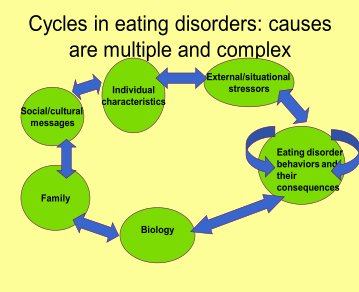Eating Disorders
Eating Disorders
Anorexia nervosa and bulimia nervosa were considered to be predominantly and almost exclusively a Western malady and an outcome of industrialization and the accompanying socio-economic changes in a population.
But, contemprary culture often cultivates and reinforces a desire for thinness. The media portrays images of thin models and actors. Attractiveness, success and worth are often equated with being thin. Peer pressure may cultivate the desire to be thin, particularly among young girls. Participation in activities that value leanness — such as wrestling, running and ballet — can increase the risk of teen eating disorders. In India, the exact incidence and prevalence of anorexia nervosa is not known, though there is indirect evidence from various clinics and hospitals that its incidence has been increasing in the last decade.
People with anorexia nervosa obsess about their weight and the food they eat and attempt to maintain their weight far below normal. They may starve themselves to prevent weight gain or to continue losing weight. People with bulimia nervosa eating large amounts of food all at one time and then try to get rid of the extra calories by vomiting or excessive exercise. People The disorders make the person preoccupied with weight and body shape, to judge themselves severely and harshly for self-perceived flaws. With
treatment, people with anorexia and/or bulimia nervosa return to healthier eating habits and reverse some of the serious complications of the disorder.
Eating disorders may run in families. Studies of twins also support that idea. An area on chromosome 1 appears to be associated with an increased susceptibility to anorexia nervosa. Some people have genetic tendency toward perfectionism, sensitivity and perseverance, all traits associated with anorexia. Serotonin — one of the brain chemicals involved in depression — also plays a role in anorexia.
Complications of Anorexia Nervosa include: Fatigue, Insomnia, Abnormal blood counts and anemia,Dizziness or fainting, A bluish discoloration of the fingers, Brittle nails, Hair that thins, breaks or falls out, Reduced interest in sex, Absence of menstruation in women, Constipation, Gastrointestinal problems, such as constipation, bloating or nausea, Dry skin, Bone loss, increasing risk of fractures, Irregular heart rhythms, Low blood pressure, Dehydration, Electrolyte abnormalities, such as low blood potassium, sodium and chlorideOsteoporosis, Heart problems, abnormal heart rhythms and heart failure, Kidney problems, and Death due to any or all of the above
Complications of Bulimia Nervosa include: Abnormal bowel functioning, Damaged teeth and gums, Swollen salivary glands in the cheeks, Sores in the throat and mouth, Dehydration, Irregular heartbeat, Menstrual irregularities or loss of menstruation (amenorrhea) in women, Depression and Anxiety, Digestive problems, and possibly a dependence on laxatives to have bowel movements, Heart problems, such as an irregular heartbeat and heart failure, Death in extreme cases.

People with eating disorders may have psychological and emotional problems that contribute to the disorder. They may have low self-esteem, perfectionism, obsessive-compulsive personality traits, impulsive behavior, anger management difficulties, family conflicts and troubled relationships. Teens who have low self-esteem might use their eating habits or weight loss to achieve a sense of stability or control.
The emergence of major eating disorders in India appears to have been under control due to several of the regional cultural and social factors especially the permissive attitudes towards body shape, lack of social pressure to be slim and the culturally accepted practices of starvation and overeating and dress preferences, till a decade ago. But the changing culture, westernization, and media, social, and peer pressure to be slim seems to have changed this trend in the last few years.
Studies shows that today, a significant number of young people, especially females, exist in India who have conflicts with regard to their eating habits and body habitus and who are at possible risk for developing serious eating disorders.
Neuro-psychiatric medication can help control the obsessive preoccupation with body image, and the associated depression and help reduce the symptoms.
Talking through and challenging beliefs and thought pattern in a structured manner helps identify and recognize unhealthy, negative beliefs and behaviors and replace them with healthy, positive ones, gain a healthier self-esteem and learn positive ways to cope with distress and other strong feelings.
One of the main goals of treatment is to restore the person to a normal weight for height. This is done through nutrition education and an eating plan that can help instill normal-eating habits and achieve a weight restoration goal.
